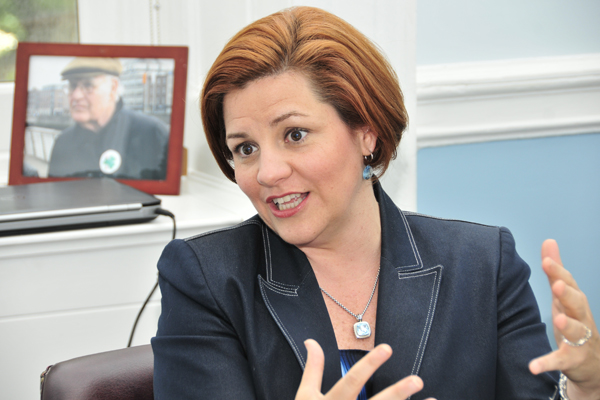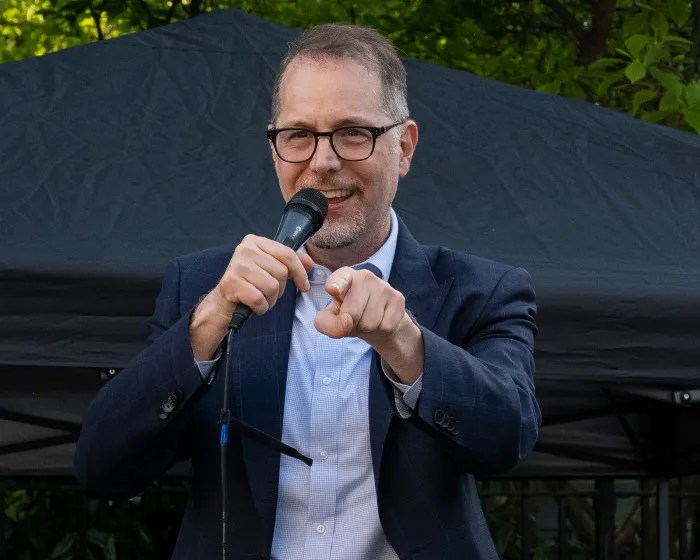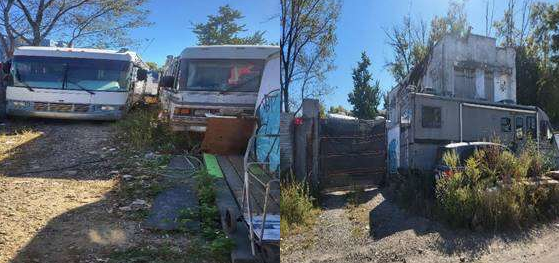
After 12 years under Mayor Bloomberg, the city is set to elect a new mayor.
In the Sept. 10 Democratic primary, there are three frontrunners, Christine Quinn, Bill de Blasio and Bill Thompson. Each is qualified to run the city, though some more than others.
Two other candidates appear unelectable: Anthony Weiner due to his ongoing sexting scandals, and John Liu because of his fundraising illegalities and struggles.
Nevertheless, earlier in the race, Liu swept the endorsements of several leading local political clubs, Village Independent Democrats, Downtown Independent Democrats and Coalition for a District Alternative.
Sal Albanese will earn votes for forgoing real estate money and opposing N.Y.U.’s 2031 plan, but his principled candidacy is a long shot.
We have thought long and hard about who to endorse in this race. Reaching a decision, for various reasons, has not been easy.
De Blasio’s compassionate message of “two cities” has resonated with some voters. His idea of funding pre-K and afterschool programs by taxing the rich a bit more seems achievable.
We like that he’s now speaking out about saving the city’s struggling hospitals, yet, by all accounts, he was M.I.A. three years ago when it was crunch time for St. Vincent’s Hospital.
A larger charge against de Blasio, however — and a legitimate one, in our view — is that his four years as public advocate have been notably undistinguished. In short, we feel that we just don’t know enough about him.
In addition, he supports allowing churches to use public schools for Sunday worship services, saying they do good work in the community. But Quinn, in a view we share, is strongly opposed on constitutional grounds of separation of church and state.
Thompson would be a strong advocate for education, and he has some good ideas. He told us, for one, that he would modify the Housing Authority’s “infill” plan by making 50 percent of these new units affordable — that this ratio could still generate revenue for the authority. Yet, despite nearly upsetting Bloomberg last time, he seems to lack fire in the belly.
Our community papers cover Christine Quinn’s West Side Council district, and we’ve been reporting about her for years. She’s hard-working, smart, tough — and, if elected mayor, would hit the ground running.
She has helped run the city since 2006 as the city’s number-two official. She knows how to get things done, has gotten much done. She thoroughly understands the city’s budget process.
She would be a tough negotiator with the unions, which will be critically important for the next mayor.
She has “brought home the bacon” for many deserving organizations and projects in District 3, which stretches on the West Side from Canal St. to 55th St. For example, she notably helped secure a new school building at 75 Morton St. for a much-needed middle school. And she has always been there for residents in large affordable housing complexes, like Westbeth and West Village Houses.
In terms of constituent services, her staff consistently earns high marks for their responsiveness — which indicates a Quinn administration would be well run.
Yet, no question, Quinn has “baggage” — and some of it is extremely large and conspicuously right in her own Council district. Her supporters say, in her defense, that there are no perfect politicians, and no perfect people — that politics is about striking compromises, that one must look at her overall record and look at her as a person.
Regarding the extension of term limits in 2008, many New Yorkers opposed it, as did we. We did not accept that the two-term limit — which had been approved by two previous voter referenda — should be overturned legislatively. Quinn helped extend term limits, giving Mayor Bloomberg, herself and other councilmembers a chance at a third term, and positioning her well for this year’s mayor’s race. And despite his slams against Quinn now on term limits, de Blasio himself actually flip-floppped on the issue.
But Quinn said the real question is what she did with those four additional years: that she helped secure 75 Morton St.; prevented layoffs for 4,100 teachers; stopped a policy that would have required people to show ID at homeless shelters; blocked a requirement for fingerprinting to receive food stamps; helped create manufacturing and tech jobs around the city; and, ultimately, passed bills on the living wage and paid sick leave.
(Full disclosure: Despite our objections to overturning term limits four years ago, we did endorse Quinn for re-election, feeling she was the best candidate at that time versus Yetta Kurland and Maria Passannante-Derr.)
As for St. Vincent’s Hospital, which heartbreakingly closed in 2010, Quinn has come under fire for, according to her critics, not fighting hard enough to keep it alive, or to win a replacement, albeit smaller, full-service hospital at the site.
The main reason St. Vincent’s closed, however, is because it suffered from years of gross mismanagement. Plus, it had assumed the debt of the city’s other failing Catholic hospitals. St. Vincent’s also had negotiated terrible reimbursement plans.
In addition, St. Vincent’s was part of a larger epidemic of about a dozen hospital closings around the city in the past decade, so it can also been seen as part of a wider problem.
Quinn admirably did get Rudin Management (which is now building condos on the former hospital site) to put up $1 million each for local school programs and for preserving local affordable housing, and she got the city to commit to buy 75 Morton as part of the deal, and she got a commitment for a park and an AIDS memorial across from the former hospital. Yet none of these “gets” staunch the pain of the hospital’s loss.
Separate from the Rudin project, a $110 million, 24/7 emergency room and comprehensive-care center will open in June 2014, inside the former St. Vincent’s O’Toole building. This facility will be a great start and we’re sure it will get heavy use.
But people desperately want — and deserve — a full-service hospital on the Lower West Side. Of course, it won’t be easy.
Quinn has told us that while Bloomberg didn’t believe in saving struggling private hospitals, if elected, she would take a different approach, and would try to save them.
Taking a break from her campaigning this Wednesday, Quinn promised us, in a phone interview: “I’m going to commit to bringing back a full-service hospital to the Lower West Side. Period.”
And, on other issues, she vowed, “We’re going to expand landmarking in Lower Manhattan, including the Village. And we’re going to build affordable housing across the city. We’re going to expand Gifted and Talented classes across the city.”
As for the Council’s approval of New York University’s 2031 expansion plan on its South Village superblocks, Quinn, in this case, we feel, yes, definitely must shoulder some responsibility for this unpopular decision. However, she and her supporters say the onus rests on Councilmember Margaret Chin, in whose district the superblocks are located.
One Quinn ally fatalistically told us, “Big institutions get more of what they want.” But N.Y.U. got way too much. In the end, the City Council approved nearly 2 million square feet of development. The decision is being challenged in court, though, and the plan may yet be scaled back.
As for de Blasio, who is an N.Y.U. graduate, in the end, he enthusiastically approved the scaled-down, revised N.Y.U. plan, and urged the City Council to do so, too.
Quinn has also been criticized for the approval of the Chelsea Market rooftop expansion. Again, she helped win “gets” for the community, but many constituents were alienated.
In general, the rap against Quinn is that she hasn’t been enough of a foil to the mayor. But the city, over all, has run well thanks to her teamwork with Bloomberg. She’s differed with him, though, picking her moments, strategically.
We definitely saw this after Sandy, when Quinn aggressively called for a federal study of storm-surge barriers for New York Harbor, much to the chagrin of Bloomberg, who slammed the scheme as too costly.
We also saw it in her State of the City address earlier this year, when she pledged to fight to protect middle-class New Yorkers and create 40,000 units of affordable housing over 10 years.
As we said when we endorsed her four years ago: Christine Quinn is the complete package as a politician, she has all the skills, experience and know-how. She already intimately knows — right now — how to run the city, something none of the other candidates can claim.
She’ll continue the positive things that we’ve liked under Bloomberg — the health initiatives, bike lanes and so forth — and, as she promised in her State of the City address earlier this year, she’ll also turn the city in a different direction.
She evoked the name of former Mayor Ed Koch in that speech. Like Koch, she’s a liberal who has become more of a centrist — which Koch always told us, in his view, was necessary to run the city. Koch, before he died, told The Villager that Quinn solidly had his vote in this race.
When we asked Quinn on Wednesday about the criticism that she has been too close to the current mayor, she didn’t hesitate in her response.
“I am my own woman,” she said firmly.
Of course, Quinn’s candidacy is historic, in that, not only is she a woman, but the first openly gay person to run for mayor.
She’s definitely no billionaire, like Bloomberg. Rather, her roots are as a hard-working tenant activist.
We do have faith that Quinn will be her own woman when she becomes mayor. And we’re excited to see the things she’ll do once she is the one in the driver’s seat.
We support Christine Quinn for mayor in the Sept. 10 Democratic primary.
Originally published, August 28, 2013




































